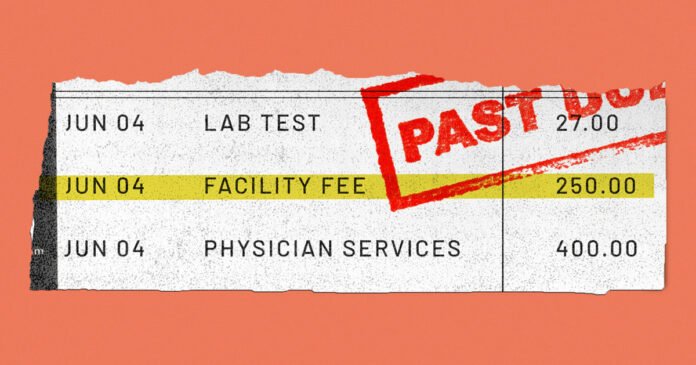In Minnesota, a family received an unexpected charge of over $400 after they took their daughter to the doctor for stomach pain. In Ohio, a man was billed $645 extra for an ear, nose and throat specialist. In New Hampshire, a resident was charged an additional $1,000 fee for an appointment with a urologist.
Across the country, patients are expressing frustration about “facility fees” — charges that a wide range of hospital systems add to bills for appointments at facilities they own, including doctors’ offices offering routine care.
A Hospital can charge a facility fees even when a patient hasn’t set foot in a hospital. More than a dozen patients who expected their insurance to cover most of the cost of their appointments at outpatient doctors’ offices told NBC News they were blindsided by the fees, which are billed on top of the cost of seeing medical providers and can easily run into the hundreds of dollars.
For more on this story, watch NBC’s “Nightly News with Tom Llamas” at 6:30 p.m. ET/5:30 p.m. CT and “Top Story” on NBC News NOW at 7 p.m. ET.
The charges have become more prevalent in recent years as more physicians are employed by hospitals and as insurance plans leave patients paying more for care before their coverage kicks in. In some communities, there is so much health care consolidation that it’s hard to find practices that don’t charge facility fees.
Researchers say patchwork laws to regulate the fees haven’t kept up.
“In most states and situations, there aren’t really limits on how high they can go,” said Christine Monahan, an assistant research professor at the Center on Health Insurance Reforms at Georgetown University, who has studied facility fees.
Hospitals argue facility fees are necessary to fund the higher level of care they say they provide at their outpatient doctors’ offices, as well as to help maintain 24/7 services such as emergency rooms. The American Hospital Association says facility fees should be covered by insurance companies, while insurers say the fees unnecessarily inflate the cost of care without improving its quality.
Here’s what consumer advocates and health policy experts say patients should know about facility fees.
Before your appointment: What to ask
Experts recommend you ask every time you book an appointment whether there is a facility fee — even for physicians you have seen before. A doctor’s office ownership, hospital affiliation or policies may have changed since your last visit.
If you are told there will be a facility fee, ask for a good-faith estimate of what the anticipated charge will be, said Patricia Kelmar, senior director of health care campaigns at the U.S. Public Interest Research Group, a consumer advocacy organization.
And don’t assume your insurance will cover the bill.
Last year, Melissa Finnegan, of St. Paul, Minnesota, was charged a facility fee of $423.15 for an appointment with a pediatric gastroenterologist for her 3-year-old. When she tried to fight it, she discovered neither the health system nor her insurance company was willing to budge.
“I put off paying it for as long as I could,” she said.
When you get the bill: How to make sense of the charges
If you receive an unexpectedly large medical bill after an appointment, call the billing office to ask for an itemized bill to understand the charges. Outpatient facility fees may be listed under other names, such as a “clinic” fee. In office signs and other disclosures about facility fees, hospitals may refer to the practice as “provider-based billing,” which means patients’ bills can be split into two separate charges: one for the physician’s services and one for visiting the facility.
“People see the bill and just assume, because it’s on their bill, that they’re going to have to pay it,” said Eric Waskowicz, senior state policy manager at United States of Care, a nonpartisan organization that fights for affordable health care.
But in some cases, you may not have to pay. Insurers suggest patients wait until they receive their explanation of benefits so they can review what part their plans will cover and they don’t accidentally overpay.
You should also check the laws in your state to make sure you were correctly charged: Some states ban facility fees for telehealth visits, for example, while others prohibit facility fees for preventive services or at certain types of medical offices.
“Know what the law is, and then use it if you can to protect yourself from that fee,” Kelmar said.
The American Hospital Association advises patients to familiarize themselves with their insurance plans’ coverage and says that if they’ve received unexpected facility fee charges to confirm that their insurance has “appropriately processed” their claims.
What to do if you can’t afford to pay
If you can’t afford to pay a facility fee, try calling the medical provider’s office to see whether the charge can be removed. If that doesn’t work, talk to your insurance company, Kelmar said. Insurance may be able to work with the billing office to reduce your out-of-pocket responsibility.
There are other options for those who can’t pay. Sometimes billing departments will give discounts to people who offer to pay smaller amounts immediately, rather than pay the larger amounts over time.
Patients can also ask about paying the cash price, instead, meaning the charge they would have incurred if they didn’t have insurance, said Monahan, the Georgetown expert. The cash price might be lower.
If that doesn’t work, search for a health care advocate in your state, Waskowicz suggested.
“To the extent it’s possible, they are able to work with insurance providers to see if they can get that fee waived,” he said.
In the meantime, keep in touch with the billing office, Waskowicz added. If you are actively contesting the bill, chances are lower that it will be sent to collections.
Kelmar said that if you can’t avoid a facility fee and are struggling to pay, don’t put the balance on a credit card. Instead, work out a payment plan directly with the provider, ideally with low or no interest.
What to do ahead of your next appointment
If you want to avoid facility fees in the future, try to find an independent doctor’s office that isn’t owned by a hospital.
That isn’t always easy: In West Covina, California, Todd Bash, 60, needed injections for a spinal problem and ended up being billed facility charges of over $450 out of pocket for a pain specialist. He then made dozens of calls trying to find a different physician who could administer the injections. But he said all the doctors’ offices he reached out to were affiliated with hospitals or didn’t take his insurance.

“It was like a full-time job trying to just navigate the system and trying to get a price,” he said.
Bash finally found an independent clinic about 20 miles away that accepted his insurance and would administer the shots for $37. Then, last month, the doctor’s office stopped accepting insurance.
“I’m back to square one,” he said.
California doesn’t have laws on the books that address facility fees. Experts say more states are trying to pass legislation that would curb the fees, which could lower patients’ bills in the future.
“There’s growing recognition that this is a problem and that consumers can’t afford it,” Monahan said.






